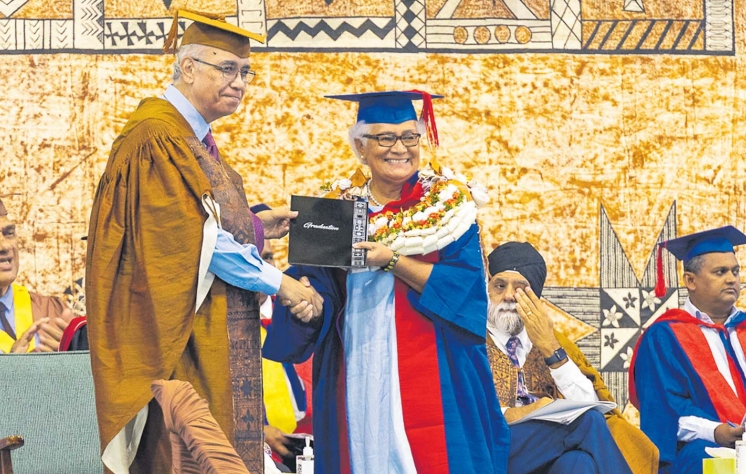WHEN Dr Ofakilomaloma Swann set out on her PhD journey, it wasn’t just for the title or academic acclaim. She had a much bigger question on her mind — why do we fall for the people we do?
Her focus? The less talked about, often uncomfortable, side of attraction — dark traits like narcissism, psychopathy and machiavellianism, and how they influence who we find appealing.
“There has not been any psychological research carried out in the region to cover the three early stages of relationship development — ideal partner concepts, attraction, and partner selection and to explore the role of the “dark traits” within these stages of relationship development,” Dr Swann said.
Her PhD, titled Testing the similarity and complementarity hypothesis in the dark triad traits: Ideal partner concepts, attraction and partner selection in a Fiji population, is the first of its kind in Fiji.
Using three studies involving online surveys and experiments with university students and couples, Dr Swann explored how Fijians perceive themselves and their partners through the lens of the “dark triad” traits.
“The three studies consistently supported the similarity hypothesis regarding dark personality traits and demographic factors like income and attractiveness,” she explained.
The results were eye-opening.
“Men preferred partners who were less ‘dark’ and physically attractive,” she said.
“Men displayed higher levels of Dark Triad traits than women and both genders perceive(d) themselves as ‘darker’ than their partners.”
This self-perception gap, especially among women, was described as the “positive illusion effect” — a tendency to view their partners through a more flattering lens. But for Dr Swann, this wasn’t just theory. The findings pointed to deeper issues.
“For me, the results were groundbreaking and pivotal in terms of understanding Fijian partner relationships, the impact on our society, the impact and shift of gender roles especially for Fijian women and the research that highlights the role of the dark traits in domestic and family violence (DFV).”
And while her research didn’t specifically study violence or abuse, she acknowledged a troubling link.
“My research showed that where the dark traits personality (undesirable and maladaptive) in male behaviour of assertiveness, dominance, authoritative and persistence — this is found to be attractive, desirable and appealing.
“Sometimes, it is modelled as a positive trait and becomes acceptable in societal norms and may become a cultural value.”
“The current literature strongly suggests the links of the dark traits to these social ills.”
The academic journey, however, was far from smooth. In fact, it nearly derailed her.
“I was quite unprepared for the significant challenges I would face as a private paying mature student from the University of the South Pacific (USP) administration. There was a general lack of support … in correcting my work, inaccessibility to the library, continued disruptions to the cultural validity of my thesis and the collection of my data and statistics during COVID.”
And then there was the supervision hurdle.
“The majority of these challenges also occurred because I was being supervised … (by) Professor Shanhong Luo from the University of North Carolina, Wilmington, an outsider of the USP system,” she said.
“My internal supervisor, Dr Crookes, was introduced a couple of years into my PhD, which was helpful.
After years of delays, confusion and self-doubt, she finally submitted her thesis.
“Although relieved, I was fatigued after two years of confusion, uncertainty, intimidation and anxiety.”
Yet she emerged from the experience stronger, more driven, and with a mission to change the system.
“With my doctorate and leadership roles, I hope to drive our Pacific focus on the significance of authentic and relevant psychological therapy and interventions to improve our relationships.”
Today, Dr Swann wears many hats. She’s a member of the USP Council and president of the Fiji Psychological Society — roles she’s using to push for better mental health support rooted in Pacific realities.
“My upbringing as the eldest girl in a family of eight and strongly connected to my Tongan maternal family … and Fijian paternal (family)… have all been crucial to my academic journey.”
After spending 20 years in Australia, she returned to Fiji with a clear vision — to build culturally relevant psychological frameworks.
“Much of the psychological theory and context is embedded in a white, nuclear and industrial culture.
“They must be tailored to Fijian and/or Pacific culture, traditions, values and beliefs if they are to be ethically relevant.”
And that’s exactly what she’s doing.
“My role as president and chair of the Fiji Psychological Society is to drive and lead … goals and objectives of the society in ensuring that authentic psychological standards and practices are being met in the diverse areas of engagement of our discipline.”
Her dream is to influence national policy and create a future where mental health services understand and reflect the lived realities of Pacific people.
“My doctorate, leadership roles, experience and skills would help me to influence policy, practice and understanding of mental ill health in Fiji and the Pacific.”
She’s particularly passionate about trauma-informed support in crisis centres.
“Managing the trauma of DFV effectively by trained professionals in the health, justice and crisis centres ensures that victims are not further victimised.”
For Dr Swann, this PhD wasn’t just a personal milestone. It was a launchpad for reform.
Understanding the psychology of love — and the darker elements that often come with it – might just be the key to healthier, more stable relationships in the Pacific.
And Dr Swann is ready to lead the way.



